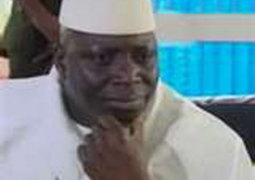The deputy chief of protocol, Ndey Haddy Jeng, yesterday told the court that former Presidential Affairs minister Momodou Sabally delayed the Vice President’s flight from South Africa for 15 minutes.
She was testifying in the economic crime case involving Sabally before Justice Amadi at the Special Criminal Court in Banjul.
In her testimony, Ndey Haddy Jeng, who told the court she is the deputy chief of protocol at the Office of the President, said her responsibilities include assisting the chief of protocol to organize the President’s schedule, appointments, meetings, travels and any other assignments.
She knew the accused as the former Secretary General and Minister for Presidential Affairs, she said, adding that in May 2014, the President was about to travel to South Africa for the inauguration of President Jacob Zuma.
She usually travelled in advance before the President to sort out logistical arrangements prior to the arrival of the President.
Whenever she travels, she would do so with an advanced delegation and for the South African trip she travelled with several ministers, security and protocol officers.
She told the court that a few days after their arrival in South Africa, she was informed that the President was no longer coming to South Africa, but the Vice President would be coming.
Then her role changed, and she assisted the protocol staff of the Vice President.
On the day of the departure to Banjul, the scheduled time for the departure was changed, and she was instructed to inform the members of the delegation.
She called to inform different members of the delegation about the change of time, and also informed the ministers to join the VP at her hotel, so they could travel together to the airport.
She was able to reach the ministers at their hotel, and Sabally was having a meeting at a separate hotel.
She reached the accused through the phone of The Gambia’s honorary consul in South Africa, with whom he (Sabally) was having a meeting, and informed him of the change in time.
She also told him that they were already on their way to the airport, and that he should join the VP. Sabally said he would.
Upon arrival at the airport, she got everyone seated in the plane, and waited for the arrival of the VP and the ministers.
After a while, the VP arrived with the ministers, and they were all seated in the aircraft.
When she noticed that the accused was not on board, she called the honorary consul again to find out where they were, and they told her that they were on their way to the airport.
They waited for a while, and the accused arrived with the honorary consul, and boarded the plane, greeted everyone and the honorary consul bade them farewell and left.
The flight then departed for Banjul.
When asked by the DPP how long Sabally kept the Vice President waiting in the plane, the witness said the VP waited for about 15 minutes.
The role of protocol, in that circumstance, to ensure every member of the delegation was seated in advance, except the VIP who was to arrive with the ministers.
The accused should have arrived with the Vice President, the witness added.
Under cross-examination by senior defence counsel AB Gaye, the witness said it was correct that the atmosphere was cordial, when the accused arrived on board the plane.
She said she was instructed by Commander Ansuman Tamba of State House about the change of time.
The VP was the head of delegation, and if the President had gone on that trip he would have been the head of delegation.
In terms of the government hierarchy and seniority, the VP was senior to the accused.
She said they spent about four days in South Africa, and that Johannesburg is a busy city.
She said when she spoke to the accused for the second time, she could not remember the accused telling her about the “traffic”, but spoke with both of them (the accused and the honorary consul).


